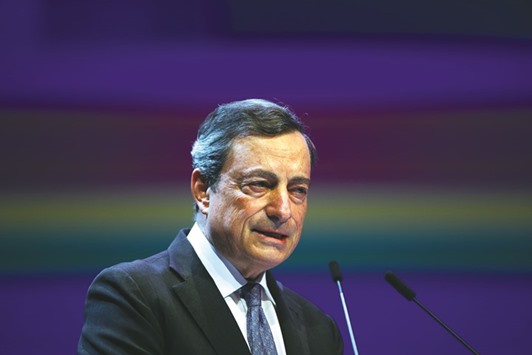Inflation unexpectedly returned to the euro area in June, suggesting that central-bank stimulus may have been starting to filter through to the economy before Britons chose to leave the European Union.
Consumer prices rose 0.1% from a year earlier, the European Union’s statistics office in Luxembourg said. That’s the first increase since January and compares with a median estimate of unchanged prices, according to a Bloomberg survey of economists.
European Central Bank President Mario Draghi has been counting on a slow inflation pick-up in the second half as oil prices stabilise and the region continues its moderate recovery. Ahead of Britain’s vote to leave the EU, he expressed confidence that price growth in the region would return to the institution’s goal of just under 2% in the “not-too- distant” future.
That may now take longer to achieve despite the latest positive surprise as growth in the 19-nation economy is set to suffer in the wake of the UK referendum. Output may drop as much as 0.5% below previous projections over the next three years, Draghi told European leaders in Brussels.
“Brexit could lead to lower growth in the euro area and that in turn may impact core inflation going forward,” says Nick Kounis, head of macroeconomic research at ABN Amro Bank in Amsterdam.
“The ECB is looking at what happens to price developments over the medium-term, and with a more subdued trajectory of core inflation they may come to the conclusion that the headline rate will stay below target for longer than they had previously expected.”
The ECB currently forecasts inflation will average 0.2% this year before accelerating to 1.3% in 2017 and 1.6% in 2018. It sees growth at 1.6% in 2016 and 1.7% in each of the following two years. Core inflation accelerated to 0.9% in June from 0.8% in May, Eurostat said.
Policy makers already have deployed a raft of unconventional stimulus that includes large-scale asset purchases, negative interest rates and long-term loans that see banks getting paid for extending credit to companies and households. Still, inflation has undershot the ECB’s goal for more than three years.
Consumer prices declined an annual 0.9% in Spain, while the inflation rate in Germany rose to 0.2%, the highest since January, according to national reports.
The euro-area release follows data last week showing that economic confidence in the region weakened in June in anticipation of Britain’s referendum, even as sentiment improved in some countries with larger shares of trade with the UK like Germany and the Netherlands.

ECB president Mario Draghi delivers a lecture during the Economic Forum in Brussels. Draghi has been counting on a slow inflation pick-up in the second half as oil prices stabilise and the region continues its moderate recovery.
